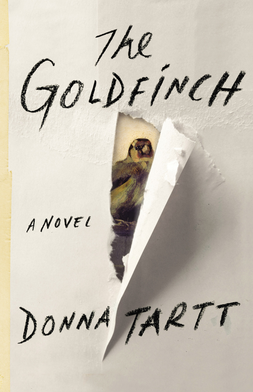The (Pulitzer-Prize-winning) Goldfinch
Usually I wait to review a book till after I have read it. But here I would like to capture what I feel before finishing the book because somehow apparently the ending is so awesome it is worth the drudgery.
Actually even if the ending wasn't supposed to be awesome. I'm going to finish the book. Because I'm so close. 90% complete.
Actually even if the ending wasn't supposed to be awesome. I'm going to finish the book. Because I'm so close. 90% complete.
I read the first 100 pages trying hard to get involved with the characters and the story but could not. It took me about 200 to 300 pages to get into the story even though there isn't any story to be honest. It's just our lady wanting to write a remarkable piece of literature that some told her, is about descriptions and on and on she goes describing. She describes a scene for some 30 pages and some 100 pages later our protagonist will remember that incident and yet again our writer describes it for 5-10 pages more like as though she has set her mind on using a thesaurus exhaustively such that there are no more adjectives, descriptive nouns and similes left to use for the scene. I think she doesn't know much about metaphors, else she might have used those too.
So bored and lost I was in the adjectives that the one important fact of the story was lost on me. In one very very very very long scene right at the beginning, our protagonist, Theo Decker takes away with him (some may say steals) a masterpiece of a painting from the Dutch Renaissance era, The Goldfinch. As you can imagine from the title of the book, this fact is extremely important to the plot. However I don't know whether I dozed off while reading and then resumed skipping a few pages by mistake not realising I haven't read them (unlikely but awful if true) or if I kept reading the words but my mind wandered away through the various more important and interest topics in this world (more likely) but I know this that I didn't realise Theo Decker took away a painting with him till much later when he kept wondering what to do with it or if he should tell someone about it. (Am I going to stop already?) And any how the plot goes round and round with Theo Decker and his lack of a parent to take care of him and his substance abuse and his mad obsessive love for a girl and all that stuff that as a reader I'm aware I'm supposed to follow him around but I can't get myself to do that. I'm only dragging my feet along and feeling slightly and then more vigorously annoyed.
The entire book screams "I want to be an epic". And off she goes trajectory after trajectory for the poor protagonist that you neither relate to or sympathise with much. And many characters have dead loved ones or they keep dying and not in the George RR Martin way (whose A Song of Ice and Fire, I think, is an epic). And the way the stories go that are sort of epics is that it's a long meandering story where the story itself is important and the climax is immaterial and the story can practically end anywhere in between too and it won't matter. Like Khaleed Hussaini's A Thousand Splendid Suns which I didn't like much (because of the story itself seemingly written for the western audiences) and Amitav Ghosh's Circle of Reason which I absolutely adore for his descriptions (which is the kind that our Tartt is trying to achieve but personally felt poorly done).
Now let me complete reading...
Here, I'm done. I have no idea why the ending is supposedly awesome. When I got to where my kindle said 99% I kept thinking I'm almost done but it kept going on. You see 1% of the book is about 8/9 pages, 8 boring absolutely incredibility pointless string of words that it was hard to go on but I kept trying. So much 'gyaan' she was trying to give you. You see I had already read the Bhagavad Gita in my life and that is an epic, a part of a much larger piece of literature which defines what the word epic means. So when an orphaned swindler with drug problems and obsessive issues with a painting he stole and hurts and dissapoints everyone who cared for him, tries to tell me the point of life, universe and everything else, it sounds annoyingly stupid.
Psst, it may be that it's an epic of a book worth the Pulitzer Prize (now I'm seriously considering the worth of the prize itself though I look back to find remarkable ones like The Interpreter of Maladies, To Kill a Mocking Bird and The Old Man and the Sea) and it may be that I'm a horribly useless reader whose mind is so narrow and cannot understand the greatness of this 'Dickensian' book that took 11 years to complete, but I'm a reader nevertheless and I think it's a complete waste of my precious time. The writer wasted 11 years but she got her time's worth with the award. Can someone give me an award for reading it?
Sigh! I need to read something written by Amitav Ghosh urgently.


Comments
Post a Comment